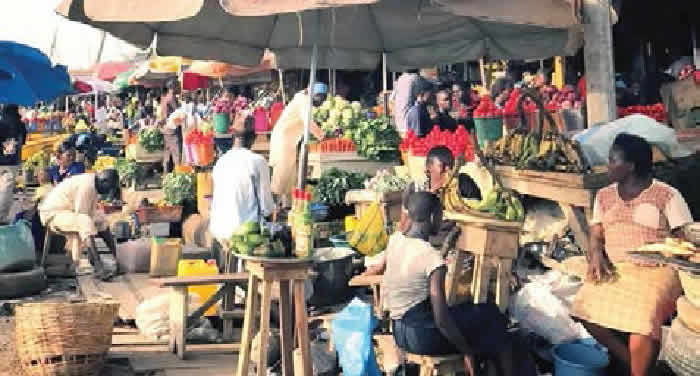Nigeria’s economy is recovering, according to official data, but the reality on the ground is more dire. The growing disparity between official growth claims and the excruciating expense of living that ordinary Nigerians must contend with is discussed in this essay by ISAAC ASABOR. The essay exposes the discrepancy between economic theory and actual experiences in Nigerian marketplaces and households, showcasing professional perspectives, grassroots voices, and a critical examination of the World Bank’s support for reforms.
Despite optimistic government statements praising economic expansion and stability, the typical Nigerian nevertheless has to contend with the rapidly rising costs of products and services in all marketplaces.
Nigerians are beginning to doubt the value of economic progress that does not result in affordability or respite in what seems to be a tale of two economies—one measured in statistics and boardroom data, and the other lived in the trenches of everyday living.
Given the aforementioned, it is convenient to start by stating that Nigeria’s GDP expanded by 3.13% in the first quarter of 2025, according to the National Bureau of Statistics (NBS).
This seems positive at first glance, particularly following years of weak performance, currency devaluation, and macroeconomic unrest.
The majority of Nigerians, however, would tell you that the alleged growth is not noticeable in their day-to-day existence.
It’s interesting to note that the Nigerian government has received praise from the World Bank for implementing strict economic reforms that are starting to produce macroeconomic gains.
“Nigeria’s reforms have helped restore macroeconomic stability, boost investor confidence, and improve public revenues,” the organization stated in its June 2025 Nigeria Development Update (NDU).
“The Tinubu administration deserves credit for implementing long-delayed reforms that could lay the foundation for stronger and more inclusive growth,” stated Shubham Chaudhuri, the former Country Director for Nigeria at the World Bank. Protecting the weak and impoverished from the immediate effects of those measures is what is now required.
The World Bank issued a clear warning: “High inflation, rising unemployment, and increasing poverty remain significant risks,” even as it commended the measures to unify the currency rate, remove fuel subsidies, and curb budgetary leakages.
Prices are not decreasing, despite the fact that the inflationary rate may be. In July 2025, for example, the Central Bank of Nigeria (CBN) kept its monetary policy rate at 27.5%, stating that it was necessary to address persistent inflation.
Despite a minor decline from 23.71% in April to 22.22% in June 2025, the headline inflation rate is still among the highest in sub-Saharan Africa.
Read Also: Peter Obi Celebrates Gov. Soludo, Calls Him ‘My Dear Elder Brother’ on His Birthday
Food inflation, which has stayed much above 30% in many areas, is more concerning.
According to a Lagos market survey, the price of a 50kg bag of rice has increased from N35,000 in 2023 to between N75,000 and N99,000.
Depending on the brand and market, a loaf of bread that cost N600 in 2023 now costs N1,200 or N1,300. In addition, prices for meat, poultry, vegetables, and cooking oil have increased by 70–100% in less than a year.
According to Mrs. Iyabo Adeoye, a merchant in Mile 12 Market, “the inflation figures don’t reflect market realities.” Customers are unable to purchase since prices are doubling every several months. Nowadays, some people purchase food in tablespoons.
Since gasoline subsidies were eliminated in 2023, transportation expenses have also increased significantly. Before deregulation, fuel cost N195 per liter; currently, it costs between N900 and N1,000.
Food prices have increased along with transportation expenses, which have increased by up to 200%, particularly in cities that rely on food that is carried from far-off rural areas.
Incomes are mostly constant but prices are rising. Even though the federal government recently announced a new minimum wage of N70,000, many private and public employers are still not complying, and implementation is still uneven.
“I have three kids to support, and I still make N45,000 a month,” Uche Chukwuma, a security guard at Ogba in Lagos, stated. “How can I make ends meet when my monthly transportation costs N20,000? In order to make ends meet, I now skip meals.
The Nigeria Labour Congress (NLC) claims that despite the updated minimum wage, the majority of Nigerian workers are still unable to cover their basic expenses, and that unless inflation is addressed thoroughly, the amount would drop again in a few months.
The cost of providing three square meals a day to a family of five has more than doubled since mid-2023, according to a recent SBM Intelligence analysis.
According to them: “Inflation is not the only issue Nigerians are dealing with today. There is a serious affordability crisis.
The discrepancy between macroeconomic performance and citizens’ microeconomic struggles has been repeatedly highlighted by economic experts.
“We are growing the economy in a way that does not touch the people,” says Dr. Muda Yusuf, the former Director-General of the Lagos Chamber of Commerce and Industry (LCCI).
Oil and gas, finance, telecoms, and other industries that don’t generate wealth or mass employment are driving growth. The industries that affect the typical person, such as manufacturing, agriculture, and SMEs, continue to face challenges related to power, insecurity, and logistics expenses.
Similarly, during a recent policy discussion, former CBN chief and Anambra State Governor Professor Chukwuma Soludo issued the same warning:
“Unless structural reforms are coupled with comprehensive human development policies, no amount of fiscal or monetary tinkering will save Nigeria’s economy.” Your GDP growth is a paper tiger if people cannot afford healthcare, food, transportation, and rent.
Traders, purchasers, and transporters all express the same frustration, according to information obtained from the ground up at Lagos’ Oyingbo Market.

